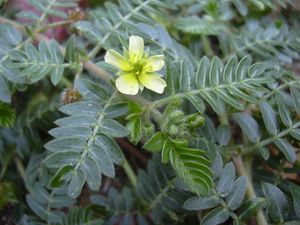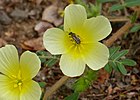Note: This is a project under development. The articles on this wiki are just being initiated and broadly incomplete. You can Help creating new pages.
Difference between revisions of "Tribulus terrestris - Gokshura"
(→Identification) |
|||
| Line 40: | Line 40: | ||
===Fruit=== | ===Fruit=== | ||
| − | {{Fruit||10 mm longe| | + | {{Fruit||10 mm longe|Fruit is easily falls apart into four or five single-seeded nutlets||5}} |
===Other features=== | ===Other features=== | ||
Revision as of 13:00, 26 August 2020
Tribulus terrestris is an annual plant in the caltrop family. It is widely distributed around the world, that is adapted to grow in dry climate locations in which few other plants can survive.
Contents
- 1 Uses
- 2 Parts Used
- 3 Chemical Composition
- 4 Common names
- 5 Properties
- 6 Habit
- 7 Identification
- 8 List of Ayurvedic medicine in which the herb is used
- 9 Where to get the saplings
- 10 Mode of Propagation
- 11 How to plant/cultivate
- 12 Commonly seen growing in areas
- 13 Photo Gallery
- 14 References
- 15 External Links
Uses
Impotency, Painful urination, Kidney diseases, Gout diseases, Cancer, Blotches, Pimples, Leprosy, Skin diseases, Psoriasis, Congestion.
Parts Used
Chemical Composition
Sterols such as beta-sitosterols or stigma. These chemical compounds help to protect the prostate gland from swelling and in combination with the X steroidal saponins, may help to protect the prostate from cancer.[1]
Common names
| Language | Common name |
|---|---|
| Kannada | ನೆಗ್ಗಿಲು Neggilu, ನೆರಿಗಿಲು Nerigilu |
| Hindi | Gokharu |
| Malayalam | Nerinnii |
| Tamil | Palleru-mullu |
| Telugu | Cinnpalleru |
| Marathi | NA |
| Gujarathi | NA |
| Punjabi | NA |
| Kashmiri | NA |
| Sanskrit | Ashvadanshtra |
| English | Puncture Vine, Caltrop |
Properties
Reference: Dravya - Substance, Rasa - Taste, Guna - Qualities, Veerya - Potency, Vipaka - Post-digesion effect, Karma - Pharmacological activity, Prabhava - Therepeutics.
Dravya
Rasa
Tikta (Bitter), Kashaya (Astringent)
Guna
Laghu (Light), Ruksha (Dry), Tikshna (Sharp)
Veerya
Ushna (Hot)
Vipaka
Katu (Pungent)
Karma
Kapha, Vata
Prabhava
Habit
Identification
Leaf
| Kind | Shape | Feature |
|---|---|---|
| Simple | The leaves are pinnately compound with leaflets less than a quarter-inch long |
Flower
| Type | Size | Color and composition | Stamen | More information |
|---|---|---|---|---|
| Unisexual | 4-10 mm wide | Yellow | 5-20 | The flowers are 4-10 mm wide, with five lemon-yellow petals. A week after each flower blooms |
Fruit
| Type | Size | Mass | Appearance | Seeds | More information |
|---|---|---|---|---|---|
| 10 mm longe | Fruit is easily falls apart into four or five single-seeded nutlets | 5 | {{{6}}} |
Other features
List of Ayurvedic medicine in which the herb is used
Where to get the saplings
Mode of Propagation
How to plant/cultivate
We have very little information on this species and are not sure how successful it will be in Britain.[5]
Commonly seen growing in areas
Tall grasslands, Weed in Europe, Sandy seashores in Japan.
Photo Gallery
References
External Links
- Ayurvedic Herbs known to be helpful to treat Impotency
- Ayurvedic Herbs known to be helpful to treat Painful urination
- Ayurvedic Herbs known to be helpful to treat Kidney diseases
- Ayurvedic Herbs known to be helpful to treat Gout diseases
- Ayurvedic Herbs known to be helpful to treat Cancer
- Ayurvedic Herbs known to be helpful to treat Blotches
- Ayurvedic Herbs known to be helpful to treat Pimples
- Ayurvedic Herbs known to be helpful to treat Leprosy
- Ayurvedic Herbs known to be helpful to treat Skin diseases
- Ayurvedic Herbs known to be helpful to treat Psoriasis
- Ayurvedic Herbs known to be helpful to treat Congestion
- Herbs with Fruits used in medicine
- Herbs with Leaves used in medicine
- Herbs with common name in Kannada
- Herbs with common name in Hindi
- Herbs with common name in Malayalam
- Herbs with common name in Tamil
- Herbs with common name in Telugu
- Herbs with common name in Sanskrit
- Herbs with common name in English
- Habit - Herb
- Index of Plants which can be propagated by Seeds
- Index of Plants which can be propagated by Cuttings
- Herbs that are commonly seen in the region of Tall grasslands
- Herbs that are commonly seen in the region of Weed in Europe
- Herbs that are commonly seen in the region of Sandy seashores in Japan
- Herbs
- Zygophyllaceae






